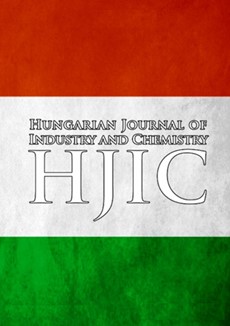MECHANISMS OF AMMONIA-SYNTHESIS REACTION REVISITED WITH THE AID OF A NOVEL GRAPH-THEORETIC METHOD FOR DETERMINING CANDIDATE MECHANISMS IN DERIVING THE RATE LAW OF A CATALYTIC REACTION
DOI:
https://doi.org/10.1515/hjic-2001-14Keywords:
Ammonia synthesis, Reaction pathways, Mechanism, Networks, Identification, Synthesis, Algorithms, p-graphAbstract
Stoichiometrically exact, candidate pathways, i.e., mechanisms, for deriving the rate law of the catalytic synthesis of ammonia have been determined through the synthesis of networks of known elementary reactions constituting such pathways. This has been undertaken to reassess the validity of available mechanisms and to explore the possible existence of additional ones for the catalytic synthesis of ammonia. Synthesizing the networks of elementary reactions is exceedingly convoluted due to the combinatorial complexity arising from the fact the number of elementary reactions involved usually far exceeds that of available elementary balances, which is only 2 for the ammonia synthesis. Such a complexity can be circumvented by the rigorous and highly efficient, graph-theoretic method adopted in the present contribution. This method follows the general framework of a mathematically exact, combinatorial method established for process-network synthesis. It is based on a unique graph-representation in terms of process graphs (P-graphs), a set of axioms, and a group of combinatorial algorithms. The method renders it possible to generate with dispatch all feasible independent reaction networks, i.e., pathways, only once. The pathways violating any first principle of either stoichiometry or thermodynamics are eliminated. Moreover, the method is capable of directly generating rapidly the acyclic combinations of independent pathways.Downloads
Published
2001-10-12
Issue
Section
Articles
How to Cite
MECHANISMS OF AMMONIA-SYNTHESIS REACTION REVISITED WITH THE AID OF A NOVEL GRAPH-THEORETIC METHOD FOR DETERMINING CANDIDATE MECHANISMS IN DERIVING THE RATE LAW OF A CATALYTIC REACTION. (2001). Hungarian Journal of Industry and Chemistry, 29(1), 71-80. https://doi.org/10.1515/hjic-2001-14




